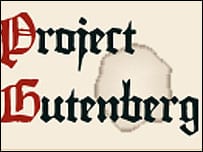Michael Hart has died. I heard this via Twitter last night but so far there appears little recognition in the news. This should be a level 1 headline. Hart founded Project Gutenberg which is dedicated to ensuring equitable access to online content. Named after the Gutenberg Press from the late 15th century, which made possible the mass distribution of printed materials, Project Gutenberg aims to do the same with digital text. Books which no longer have copyright restrictions are digitised and made freely available in a range of formats enabling users to search, read and quote content. The project also invites users to participate. Become a Gutenberg volunteer and be sent digitised pages to proofread and check for errors. Volunteers are also invited to burn cds for people without Internet access. Project Gutenberg espouses the principles of open access while remaining focused on content rather than appearance; a philosophy we are in danger of losing in our current celebrity obsessed culture. It is a fantastic free resource; a legacy from the early days of mergence between the Internet and the World Wide Web and the founding philosophy of democratic access.
“As we move towards a highly connected world it is critical that the web be usable by anyone regardless of individual capabilities and disabilities.” (Berners Lee, 1997)
“…if we succeed making web accessibility the norm rather than the exception, this will benefit not only the disability community but the entire population.” (Dardailler, 1997).
The death of Michael Hart, founder of Project Gutenberg, is an ideal time to remember these principles. I hope Hart will be both remembered and celebrated not only as someone who recognised the potential power of digital data for democratic access, but who actually did something about it too.
Berners Lee, T. (1997) World Wide Web Consortium (W3C) Launches Web Accessibility Initiative. WAI press release 7 April 1997. Available at http://www.w3.org.
Dardailler, D. (1997) Telematics Applications Programme TIDE Proposal. Web Accessibility Initiative (WAI) Available at http://www.w3.org.
